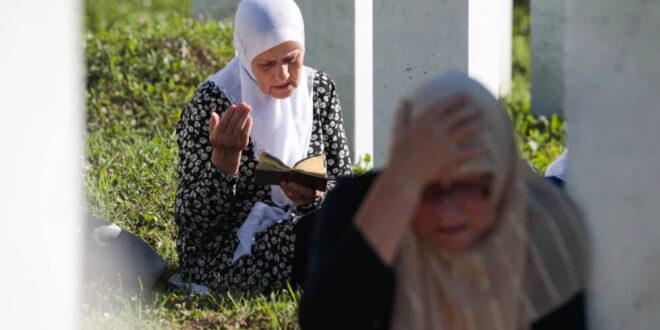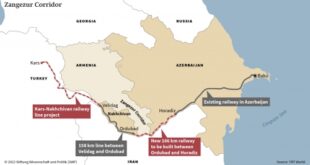A German-Rwanda-sponsored UN resolution proposing to declare July 11 as International Genocide Remembrance Day to commemorate the genocide of more than 8,000 Bosnian Muslims by Bosnian Serbs in 1995 sparked protests and a strong lobbying campaign against its adoption by the President of Serbia and the leadership of the Bosnian Serbs, writes the Associated Press (AP) agency.
The General Assembly of the United Nations has scheduled a debate on the resolution for May 23, which will be followed by a vote in this 193-member world body.
The final draft of the resolution would designate July 11 as the “International Day of Remembrance and Remembrance of the 1995 Srebrenica Genocide,” to be observed annually.
The massacres began on July 11, 1995.
The draft asks the United Nations to prepare an information program and calls on states, organizations, civil society and others to mark this day with special ceremonies and activities to commemorate and honor the victims, as well as “appropriate education and public awareness activities”.
On July 11, 1995, Bosnian Serbs occupied the zone in Srebrenica that was under UN protection.
They separated at least 8,000 Bosniak Muslim men and boys from their wives, mothers and sisters and slaughtered them.
The International Court of Justice, the UN’s highest tribunal, determined in 2007 that the acts committed in Srebrenica constituted genocide, and the court’s decision was included in the draft resolution.
It was the first genocide in Europe since the Nazi Holocaust in World War II, when six million Jews and members of other minorities were killed.
Serbian populist President Aleksandar Vučić, as well as the Bosnian Serb leadership, strongly oppose the adoption of the resolution on Srebrenica, saying that it brands all Serbs as a “genocidal people”, although the draft does not say so.
Vučić and his government are campaigning both in the UN and among developing countries to get support for “no”.
They say they have already won a majority against the resolution.
A simple majority of members of the UN General Assembly is required for the resolution to pass.
Vučić, as well as Bosnian Serb leader Milorad Dodik, have mentioned several times the possibility of paying war reparations if the resolution is adopted.
Local analysts say Serbian leaders, including Vučić, also fear they could be tried for active participation in the bloodshed.
The draft resolution condemns “without reservation any denial of the genocide in Srebrenica as a historical event”.
It also “unreservedly condemns actions that glorify those convicted of war crimes, crimes against humanity and genocide by international courts, including those responsible for the genocide in Srebrenica”.
Bosnian Serb wartime political leader Radovan Karadžić and his military commander Ratko Mladić were convicted of genocide in Srebrenica by the UN special war crimes tribunal in The Hague, Netherlands.
In all, the Tribunal and the courts in the Balkans sentenced close to 50 Bosnian Serb wartime officials to long prison terms.
However, most Serbian and Bosnian Serb officials still celebrate Karadzic and Mladic as national heroes.
They continue to downplay or even deny the killings in Srebrenica, which deeply offended the relatives of the massacre victims and the survivors.
In a meeting with Dodik in Budapest on Wednesday, Hungarian Foreign Minister Peter Szijarto said his country would vote against the resolution. He called the genocide the “Srebrenica tragedy” and said that the resolution would “intentionally or unintentionally demonize the entire Serbian people” and incite tensions in the surrounding area.
Deputy US Ambassador Robert Wood said that “Dodik’s dangerous actions and secessionist rhetoric threaten peace and stability in the region”, and “genocide denial also prevents reconciliation”.
“Marking historical truths and accepting the facts is important and moves the region forward on the road to reconciliation,” Wood said. “And honoring the victims of genocide strengthens the values reflected in the UN Charter,” he added.
Russian ambassador to the UN Vasiliy Nebenzia, whose country has strong ties with Serbia and the Bosnian Serbs, said that the adoption of the resolution without the consent of all Bosnian sides is a violation of the country’s constitution and the Dayton Peace Accords of 1995, which ended the war.
“We consider this provocative text a threat to peace and security in the country and the region as a whole,” he said, accusing Germany and Rwanda of provoking protests instead of promoting reconciliation.
China’s deputy ambassador to the UN, Geng Shuang, reiterated Beijing’s call for sponsors to engage with key parties and member states to reach consensus on the draft resolution.
He said that there are still “big differences” and that “coercion is contrary to the spirit of promoting reconciliation” within Bosnia and among countries in the region.
 Eurasia Press & News
Eurasia Press & News

